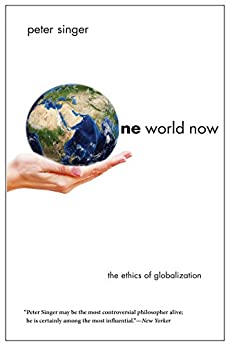 |
Home |
Catalogs |
Contact Us |

Books on:
Animal RightsBlack Lives Matter
Democracy
Eco Agriculture
Eco History
Genetic Engineering
Green Politics
Local Economics
Peace and Nonviolence
Simple Living
Trees and Forests
 |
One World Now
The Ethics of Globalization
by Peter Singer
Yale University Press, Revised Edition, 2016
Purchase on Amazon.com
Known for his original and courageous thinking on matters ranging from the treatment of animals to genetic screening, in One World Now Peter Singer turns his attention to the ethical issues surrounding globalization. The book addresses climate change, economic globalization, foreign aid, human rights, immigration, and the responsibility to protect people from genocide and crimes against humanity, whatever country they may be in. Every issue is considered from an ethical perspective. One World Now poses bold challenges to narrow nationalistic views and offers valuable alternatives to the state-centric approach that continues to dominate ethics and international theory.
Praise for One World
"Many people have written about the economic meaning of globalization; in One World Peter Singer explains its moral meaning. His position is carefully developed, his tone is moderate, but his conclusions are radical and profound. No political theorist or moral philosopher, no public official or political activist, can afford to ignore his arguments."-- Michael Walzer, Institute for Advanced Study (on the earlier edition)
"This is a valuable update to a book that excels at examining competing solutions for some of the world’s critical economic, environmental, and political problems."—David A. Rezvani, Dartmouth College
"One World is an instructive book, especially for American students wrestling with America’s poor record as a global citizen. However unpleasant this may be, awareness of the reality is a necessary condition for young people to want to get involved to change things for the better."—David Hoinski, West Virginia University
"As someone who uses this book and some of its details for teaching, I greatly welcome the updated data and evidence. I am not aware of other books on this subject that are accessible to general readers."—Linda Dynan, Northern Kentucky University
"Peter Singer writes, as always, lucidly and with relentless logic. Getting states to behave ethically is a heroic aspiration, but this book will give even the most obdurate realist much to think about."–Gareth Evans, Past President, International Crisis Group, former Australian Foreign Minister
"Peter Singer may be the most controversial philosopher alive; he is certainly among the most influential."—New Yorker (on the earlier edition)
Quotes from One World
"We have now considered the four charges commonly made against the WTO. We found that, first, the WTO does, through its use of the product/process rule and its very narrow interpretation of Article XX, place economic considerations ahead of concerns for other issues, such as environmental protection and animal welfare, that arise from how the product is made. If the human rights of the workers were violated in the process of making the product, this would presumably be treated in a similar manner, if a complaint were made. Second, while the WTO does not violate national sovereignty in any formal sense, the operations of the WTO do in practice reduce the scope of national sovereignty. The WTO's defense to this charge, that the governments of member-nations have voluntarily opted for this curtailment, is weakened by the surprising interpretation its Appellate Body as given to Article XX; but even if this were not the case, and the member-nations had fully understood how the treaty they were signing would operate, it would still be the case that WTO membership curtails national sovereignty in the sense that, in the real world, it is often hard to leave the WTO and as long as it remains a member, a country's power to make some important decisions is eroded. Third the WTO is undemocratic both in theory and practice, firstly because a procedure requiring unanimous consent to any change is not a form of democracy, secondly because the dispute panels and the Appellate Body are not responsible to either the majority of members or the majority of the planet's adult population, and thirdly because the organization is disproportionately influenced by the major trading powers. On the fourth, and arguably most important charge against the WTO, however, that it makes the rich richer and the poor poorer, the verdict has to be: not proven. The available evidence is insufficient to convict either globalization or the WTO of that charge."
...
"Another strange aspect of The Law of Peoples is Rawls's readiness to invoke, against the idea of economic redistribution between nations, arguments that could easily be brought--indeed have been brought--against economic redistribution between individuals or families within the same nation. Thus he invites us to consider an example of two countries that are at the same level of wealth and have the same size population. The first decides to industrialize, while the second prefers a more pastoral and leisurely society and does not. Decades later, the first is twice as wealthy as the second. Assuming that both societies freely made their own decisions, Rawls asks whether the industrializing society should be taxed to give funds to the pastoral one. That, he says, 'seems unacceptable.' But if Rawls finds this unacceptable, how does he answer the critics of his position in A Theory of Justice who find it unacceptable for a person who has worked hard and achieved wealth to be taxed in order to support someone who has led a more relaxed life and so is now, in terms of resources held, among the worst-off members of society? Both cases raise a problem for anyone who supports the redistribution of wealth, and if the problem can be answered in the case of redistribution within a society, I see no reason why it cannot be answered in the case of redistribution between societies."
Table of Contents of One World
- A Changing World
- One Atmosphere
- One Economy
- One Law
- One Community
- A Better World?
About Peter Singer
Reader Comments |
